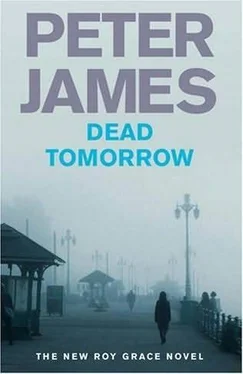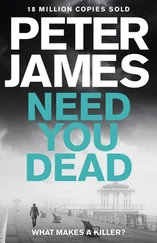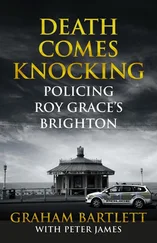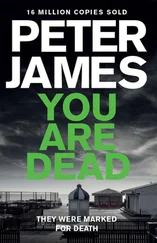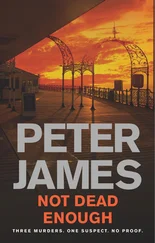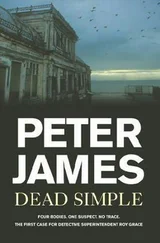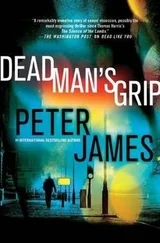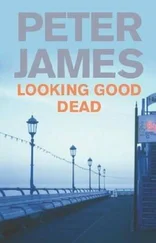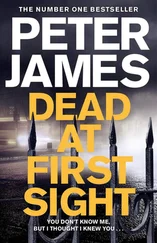‘I’m hoping the coverage will help bring members of the public forward,’ Ponds said. ‘I’ve circulated touched-up photographs of all three to every paper and television news station and to the Internet news feeds.’
‘Is Absolute Brighton TV on your list?’ Nick Nicholl asked, referring to the city’s relatively new Internet channel.
‘Absolutely!’ Ponds replied, then beamed, as if pleased with his wit.
Grace glanced down at his notes.
‘Before we have your individual reports, there’s been one interesting serial today,’ he said. ‘Might be nothing, but we should follow it up.’ He looked at Glenn Branson. ‘You’d be the man, as you’re our nautical expert.’
There was a titter of laughter.
‘Projectile-vomiting expert, more likely,’ Norman Potting chuckled.
Ignoring him, Grace went on, ‘A fishing boat, called the Scoob-Eee , based at Shoreham, has been reported missing since Friday night. Probably nothing, but we need to monitor anything out of the usual anywhere along the coast.’
‘Did you say Scoob-Eee, Roy?’ Branson asked.
‘Yes.’
‘That – that’s the boat I went out on, on Friday, with the SSU.’
‘You didn’t tell us you bloody sank it, Glenn!’ quipped Guy Batchelor.
Glenn ignored him, thinking hard and very shocked. Missing as in stolen or sunk ? Turning to Grace, he asked, ‘Do you have any more information?’
‘No – see what you can find.’
Branson nodded, then sat in silence, only half concentrating on the rest of the briefing.
‘Sounds like racketeers to me,’ Norman Potting said all of a sudden.
Grace looked at him quizzically.
Potting nodded. ‘It was Noël Coward, wasn’t it? What he said about Brighton. Piers, queers and racketeers. Sums it up, doesn’t it?’
Bella gave him a huffy stare. ‘So which one are you?’
‘Norman,’ Grace said, ‘there are people who would find that offensive. All right?’
For a moment the DS looked as if he was going to argue back, but then he appeared to think better of it. ‘Yes, chief. Understood. Just trying to make the point that with three bodies missing their organs, we could be looking at racketeering – in human organs.’
‘Anything you want to expand on that?’
‘I’ve given a brief to Phil Taylor and Ray Packham down in the High-Tech Crime Unit to see what they can find on the Internet. I’ve had a trawl myself, and yes, it’s widespread.’
‘Any UK connections?’
‘Not so far. I’m widening the search as far as I can, with Interpol – in particular Europol. But I don’t think we’re going to get any quick answers from them.’
Grace concurred with that. Having had many previous experiences with Interpol, he knew that the organization could be infuriatingly slow – and at times arrogant.
‘But I have come up with something that may be of interest,’ Potting said. He heaved himself up from his chair and walked over to the whiteboard, on which was fixed the blow-up photograph of the tattoo on the teenage girl’s arm. Pointing at it, he said the name aloud: ‘Rares.’
Bella rattled the Maltesers in her box and took out one.
‘I did some checking, mostly on the Internet,’ Potting went on. ‘It’s a Romanian name. A man’s first name.’
‘Definitely Romanian – and nowhere else?’ Grace asked him.
‘Unique to Romania,’ Potting responded. ‘Of course, that doesn’t necessary mean this Rares, whoever he might be, is Romanian. But it’s an indicator.’
Grace made a note. ‘Good, that’s very helpful, Norman.’
Potting belched and Bella shot him daggers. ‘Oops, pardon me.’ He patted his belly. ‘Something else, Roy, that I think might be relevant,’ he ploughed on. ‘The United Nations publishes a list of rogue countries involved in human trafficking for organ transplants. I checked it out.’ He smiled grimly. ‘Romania features on it – prominently.’
The hospital offered to send an ambulance, but Lynn didn’t want that, and she was sure Caitlin wouldn’t either. She decided to take her chances with the Peugeot.
Mal’s phone went straight to voicemail, which indicated he was at sea, so she sent him an email, knowing he could pick those up:
Matching liver donor found. She is having the transplant tomorrow at 6 a.m. Call me when you can. Lynn
For once in the car Caitlin did not send any texts. She just gripped her mother’s hand all the time that Lynn did not need it for changing gear, a weak, clammy, frightened grip, her jaundiced face flashing in the street lights and in the stark glare of oncoming headlights, like a yellow ghost.
A record on Southern Counties radio ended and the news came on. The third item was speculation that there was a human organ theft ring operating in Sussex. A policeman came on the radio, someone called Detective Superintendent Roy Grace, speaking with a strong, blunt voice: ‘It is far too early in our investigation to speculate, and one of our main lines of enquiry at this stage is to find out if these bodies were dumped by a passing ship in the Channel. I want to reassure the public that we consider this an isolated incident, and-’
Lynn punched the CD button, hastily silencing the radio.
Caitlin squeezed her mother’s hand again. ‘You know where I’d really like to be right now, Mum?’
‘Where, darling?’
‘Home.’
‘You want me to turn the car round?’ Lynn said, shocked.
Caitlin shook her head. ‘No, not our house. I’d like to be home.’
Lynn blinked away the tears that were forming. Caitlin was talking about Winter Cottage, where she and Mal had lived when they had got married, and where Caitlin had grown up, until the divorce.
‘It was nice there, wasn’t it, angel?’
‘It was bliss. I was happy then.’
Winter Cottage. Even its name was evocative. Lynn could remember that summer day when she and Mal had first gone to see it. She was six months pregnant with Caitlin at the time. There had been a long drive down a cart track, past a working farm, to the small, ramshackle cottage, ivy-clad, with its cluster of falling-down outbuildings and broken-paned greenhouse, but a beautifully tended lawn and a collapsed little Wendy house that Mal had lovingly rebuilt for Caitlin.
She could remember that first day so well. The musty smells, the cobwebs, the rotting timbers, the ancient range in the kitchen. The view to die for out across the softly rolling South Downs. Mal putting his strong arm around her shoulders and squeezing her, discussing all the things he could do himself to fix it up, with her help. A big project, but their project. Their home. Their piece of paradise.
And she could imagine, standing there then, what it would be like in winter, the sharp cold smells, the burning firewood, rotting leaves, wet grass. The place felt so safe, so secure.
Yes. Yes. Yes.
Every time Caitlin brought it up, it made her sad. And it made her even sadder that still, over seven years after they had moved out, when Caitlin was just eight, she referred to Winter Cottage – and in particular its little Wendy house – as her home . And not the house they lived in now. That hurt.
But she could understand. Those eight years at Winter Cottage were Caitlin’s healthy years. The time in her life that she had been carefree. Her illness had begun a year later, and at the time Lynn had wondered whether the stress of seeing her parents’ marriage break up had been a contributing factor. She always would.
They were passing the IKEA chimneys again. Lynn was starting to feel they were becoming a symbol in her life. Or some kind of new marker posts. Old, normal life south of those chimney stacks. New, strange, unknown, reborn life north of them.
Читать дальше
